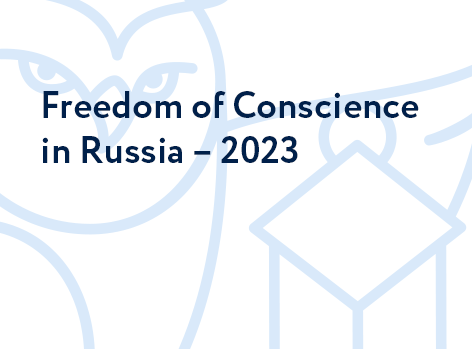SOVA Research Center took part in the 2022 OSCE Warsaw Human Dimension Conference (October 2 - 13). Here we publish the statement made by the center’s expert Olga Sibireva at the Plenary Session IV "Fundamental freedoms II" on October 6.
Dear participants, my name is Olga Sibireva. I am obliged by Russian law to say that the non-profit organization Sova Center was designated in Russia as a foreign agent.
I would like to draw your attention to some of the problems in the sphere of freedom of conscience that exist in Russia today.
1. The unjustified persecution of religious organizations as allegedly extremist continues. Jehovah's Witnesses are still subjected to the most massive repressions. Their sentences are more severe, including for the elderly and people with disabilities. As of mid-September 2023, 125 Jehovah's Witnesses were imprisoned in colonies and pre-trial detention centers.
2. More religious organizations were added to the list of organizations whose activities have been declared undesirable in Russia. Over the past year, two Ukrainian Charismatic Protestant organizations were added to the list: the All-Ukrainian Spiritual Center Renaissance and the associated Renaissance charitable foundation as well as the U.S.-based Full Gospel Church Transformation Center Covenant Network.
Believers face administrative and criminal charges for cooperation with "undesirable" religious organizations. For example, in July, Pentecostal pastors Nikolai Ulitin and Sviatoslav Yugov were sentenced to three and a half years of imprisonment each for cooperation with the New Generation Church.
3. The status of "foreign agent" also imposes serious restrictions on the ability to carry out any activities. In 2023, for the first time, important religious figures were included in the list of individuals – foreign agents: the Supreme Lama of Kalmykia, Telo Tulku Rinpoche, and the former Chief Rabbi of Moscow, Pinchas Goldschmidt. Both religious leaders had left Russia even before that.
4. Defamatory materials about religious minorities are still regularly published in federal and regional media, without any public condemnation, much less administrative sanctions.
Recommendations to OSCE participating States:
- To abandon the practice of recognizing organizations as extremist and banning organizations on the basis of their doctrine as such, including the assertion of the superiority of their religion over others. And, accordingly, abandon the practice of prosecuting followers of the relevant religious movements for religious meetings and joint prayers as participation in banned organizations. (In Russia, this applies, for example, to Jehovah's Witnesses, followers of Said Nursi (banned as the Nurdjular organization), Tablighi Jamaat, and Alla Ayat).
- To abandon bans on books and other religious materials on similar grounds. It is even better not to use the mechanism of creating a list of banned books and other materials at all.
- To abandon the use of the concepts of "undesirable organization," "foreign agent," and similar defamatory labels that are not based on clear legal criteria, including in relation to religious associations.
- Abolish far-fetched restrictions on preaching and other religious statements that narrow down the freedom of such statements more than the freedom of expression in general. (In Russia, repeal the "anti-missionary" amendments from the 2016 Yarovaya Package).
- Avoid discriminatory and defamatory statements by public officials and state-sponsored media against religious communities, especially religious minorities. In practice, this most often concerns some Muslim and Protestant associations and new religious movements.

